|
March 1, 2018
Resistance to Nova Scotia Anti-Social
Offensive
Working People Rally at Legislature
to Defend the Rights of All
PDF

Nova Scotians Rise Up day of action, February 27, 2018 at Nova Scotia
legislature.
Resistance
to
Nova
Scotia
Anti-Social
Offensive
• Working People Rally at Legislature to Defend
the Rights of All
• The Need to Take Up the Work for Empowerment
Sears Canada Bankruptcy
• Workers and Retirees Demand Justice for
Misappropriation of Pensions
Transportation
• Dangerous Situation Requires Workers Hold
Governments and Private
Interests to Account
• Senate Committee Report on Automated Vehicles
• Human Factor and Social Responsibility at the
Heart of Workers'
Security - Normand Chouinard
Resistance to Nova Scotia Anti-Social
Offensive
Working People Rally at Legislature
to Defend the Rights of All

February 27 marked a day of action in Halifax
called "Nova Scotians Rise Up." Around one thousand workers from all
walks of life, youth and students came together throughout the
afternoon at the opening of the Nova Scotia legislature to denounce the
anti-social agenda of the McNeil Liberal government and its attacks on
rights.
Teachers, nurses, forestry workers, fishers, injured
workers represented by the Pictou County Injured Workers' Association,
students, parents, and others from all around Nova Scotia stood at the
steps of the legislature to denounce the McNeil government for its
attacks on the rights of workers and its inability to address any of
the pressing
problems facing the people of the province, the economy and social and
natural environment.
 During the five hour event
to counter the anti-social austerity agenda of the McNeil Liberals,
speaker after speaker highlighted a common theme that the government in
power does not represent the people and their various concerns but
rather powerful private interests that have seized control. The
government's response, when confronted with a collective
of workers who demand their rights such as the teachers or nurses, is
to criminalize them and refuse to bring in the improvements to their
sector that those who do the work propose. In the education sector, the
McNeil government has consistently ignored the expertise and knowledge
of the teachers and other education workers who
have positive ideas to improve the conditions and guarantee the right
of all to the highest level of education a modern society can organize.
Instead, the government hired a consultant who told it what it wanted
to hear that an austerity agenda is the only option. During the five hour event
to counter the anti-social austerity agenda of the McNeil Liberals,
speaker after speaker highlighted a common theme that the government in
power does not represent the people and their various concerns but
rather powerful private interests that have seized control. The
government's response, when confronted with a collective
of workers who demand their rights such as the teachers or nurses, is
to criminalize them and refuse to bring in the improvements to their
sector that those who do the work propose. In the education sector, the
McNeil government has consistently ignored the expertise and knowledge
of the teachers and other education workers who
have positive ideas to improve the conditions and guarantee the right
of all to the highest level of education a modern society can organize.
Instead, the government hired a consultant who told it what it wanted
to hear that an austerity agenda is the only option.
A fisher spoke of a McNeil government that ignores
their concerns and does the same thing as with the teachers, hiring
consultants to give credence to an agenda that the government has
already set in opposition to the views and knowledge of those who do
the work. Speakers denounced the government for suggesting that it has
a mandate to
make the tough decisions, which means attacking workers, social
programs and public services through an anti-social austerity agenda
that solves no problem.
This line of having a mandate is totally false. The
party-dominated system called representative democracy negates the
fundamental democratic rights of citizens to select candidates who
stand for election and to set the agenda of the discussion during an
election and establish the mandate they want applied by a government
they elect. The
entire party-dominated electoral process and the power of the
monopolized mass media block the people from participating in politics,
from selecting representatives from amongst their peers, from setting
an agenda to solve problems in a manner that favours the people and
from assessing and holding to account the government they chose. Under
the current system, the people have no power to collectively express
what they think or set an agenda and direction of the sectors where
they work to solve problems let alone for the province or Atlantic
region. The best they are offered is to appeal to the decision-makers,
who represent powerful private interests to take a pause in their
attacks, be
more fair and less arrogant.
 The people's stand to defend
their rights and the rights of all at the rally and through their
collective actions as teachers, nurses and others is an expression of
their desire to be the decision makers and to have the power in their
hands to set an agenda that favours them generally in the economy and
society, and in particular in their
work sectors. The people's stand to defend
their rights and the rights of all at the rally and through their
collective actions as teachers, nurses and others is an expression of
their desire to be the decision makers and to have the power in their
hands to set an agenda that favours them generally in the economy and
society, and in particular in their
work sectors.
Activists from the Workers' Centre of the Communist
Party of Canada (Marxist-Leninist) participated in the rally
distributing several hundred copies of the February 22 edition of Workers'
Forum while gathering subscriptions for the Party press and
engaging in spirited discussion with participants. They expressed the
Party's
deep appreciation for the bravery of the teachers in standing up to the
McNeil regime criminalization of their struggle with a resounding
strike vote despite the threats of fines and imprisonment.
The activists affirmed the line of the Party that our
security lies in organized conscious battles to defend the rights of
all. The Canadian working people all across the country stand with the
Nova Scotia teachers, health care workers, all public sector workers
and others in their struggle for their rights with this oppressive and
anti-social
government.


The Need to Take Up the Work for Empowerment
The right of the people to a say and control over their
terms of employment and the social conditions they face cannot be
denied or negated. In passing bill after bill to deprive public sector
workers of their right to a say over their terms of employment and the
conditions of the work they perform, the Nova Scotia government exposes
itself as
unfit to rule and in criminal contempt of the people's rights. The
people do not and will never accept a government that deprives them of
their rights and forces anti-social conditions on the youth and most
vulnerable.
 For the Liberal government
to invoke police powers to criminalize the teachers and others who
demand their rights is beyond the pale. This will not pass because the
people will not allow attacks on the rights of any individual or
collective. The McNeil government or any government has its head in the
sand if it thinks these strong-arm tactics
against the people will succeed. We are in the 21st century where the
rights of all are considered inviolable. If the McNeil Liberals think
they can hold back the march of history towards the right of people to
decide and control those affairs that affect their lives such as their
terms of employment, education, health care and the social and
natural environment, it means they are obsessed and blinded with their
class privilege and power. For the Liberal government
to invoke police powers to criminalize the teachers and others who
demand their rights is beyond the pale. This will not pass because the
people will not allow attacks on the rights of any individual or
collective. The McNeil government or any government has its head in the
sand if it thinks these strong-arm tactics
against the people will succeed. We are in the 21st century where the
rights of all are considered inviolable. If the McNeil Liberals think
they can hold back the march of history towards the right of people to
decide and control those affairs that affect their lives such as their
terms of employment, education, health care and the social and
natural environment, it means they are obsessed and blinded with their
class privilege and power.
The people of Nova Scotia and indeed all of Canada are
one with the teachers, health care providers and other public sector
workers who demand a say over their terms of employment and increased
investments in the essential social programs and public services they
provide. Students, parents and concerned members of the polity have
long
demanded an educational system of the highest quality to lift up all
our youth to the highest cultural, spiritual and educational levels
possible. A pro-social step forward begins with increased investments
in social programs and public services and giving workers a say and
control over their terms of employment and workplaces.
Those who own and control major parts of the economy
must recognize the value public sector workers create within the people
and for the society generally and realize it in a proper exchange with
value their own workers create. Without this recognition and without
exchanging a portion of the value their workers create for their own
enterprises then both the economy and society will collapse. They and
their representatives in government cannot continue spouting inanities
about their inability as taxpayers to pay for educated and healthy
workers and a society fit for human beings.
 Educated and healthy workers
are the essential core of the economy -- the human factor that produces
the goods and services a modern economy, the people and society require
for their existence. For these private interests to deny exchanging the
value their own workers produce for the value their enterprises receive
from social programs and public services is self-serving
in the extreme and a path to destruction and ruin. Their
non-recognition of the value public sector workers produce and their
unwillingness to realize that value in return for the value they
receive is the bogus material reason for an austerity program and to
deny the rights of the people to their say and control. The subjective
reason to deprive
people of their rights is the fanatical attachment of the rich and
their representatives to class privilege and power. The rich and their
representatives in government consider themselves better than the
masses, the hoi polloi as they call those they label as lesser
human beings, nobodies and incapable of ruling themselves, the economy
and
society. Educated and healthy workers
are the essential core of the economy -- the human factor that produces
the goods and services a modern economy, the people and society require
for their existence. For these private interests to deny exchanging the
value their own workers produce for the value their enterprises receive
from social programs and public services is self-serving
in the extreme and a path to destruction and ruin. Their
non-recognition of the value public sector workers produce and their
unwillingness to realize that value in return for the value they
receive is the bogus material reason for an austerity program and to
deny the rights of the people to their say and control. The subjective
reason to deprive
people of their rights is the fanatical attachment of the rich and
their representatives to class privilege and power. The rich and their
representatives in government consider themselves better than the
masses, the hoi polloi as they call those they label as lesser
human beings, nobodies and incapable of ruling themselves, the economy
and
society.
This anti-social experience with the McNeil Liberals
shows the importance of stepping up the organizing of the people to
fight to defend the rights of all and open a path to democratic
renewal. Our security lies in the organized and conscious fight to
defend the rights of all in this modern world still dominated by a
ruling elite blinded with
class privilege and police powers. The people of Nova Scotia cannot and
will not allow the McNeil Liberals to crush the rights of any section
of the people and deprive the people of their control over the affairs
that affect them and their society. The people stand with the teachers,
health care workers, all public sector workers and others in their
battle for their rights and increased investments in social programs
and public services.
Denounce the McNeil Government for its
Attack on Rights!
Fight for Increased Investments in Social Programs and Public Services
to Meet the Needs of the People and Society!
Stop Paying the Rich!
Whose Economy? Our Economy!
Who Decides? We Decide!
Join the Organized Movement to Build the New!
Contact: nsworkersforum@yahoo.com

Sears Canada Bankruptcy
Workers and Retirees Demand Justice for
Misappropriation of Pensions
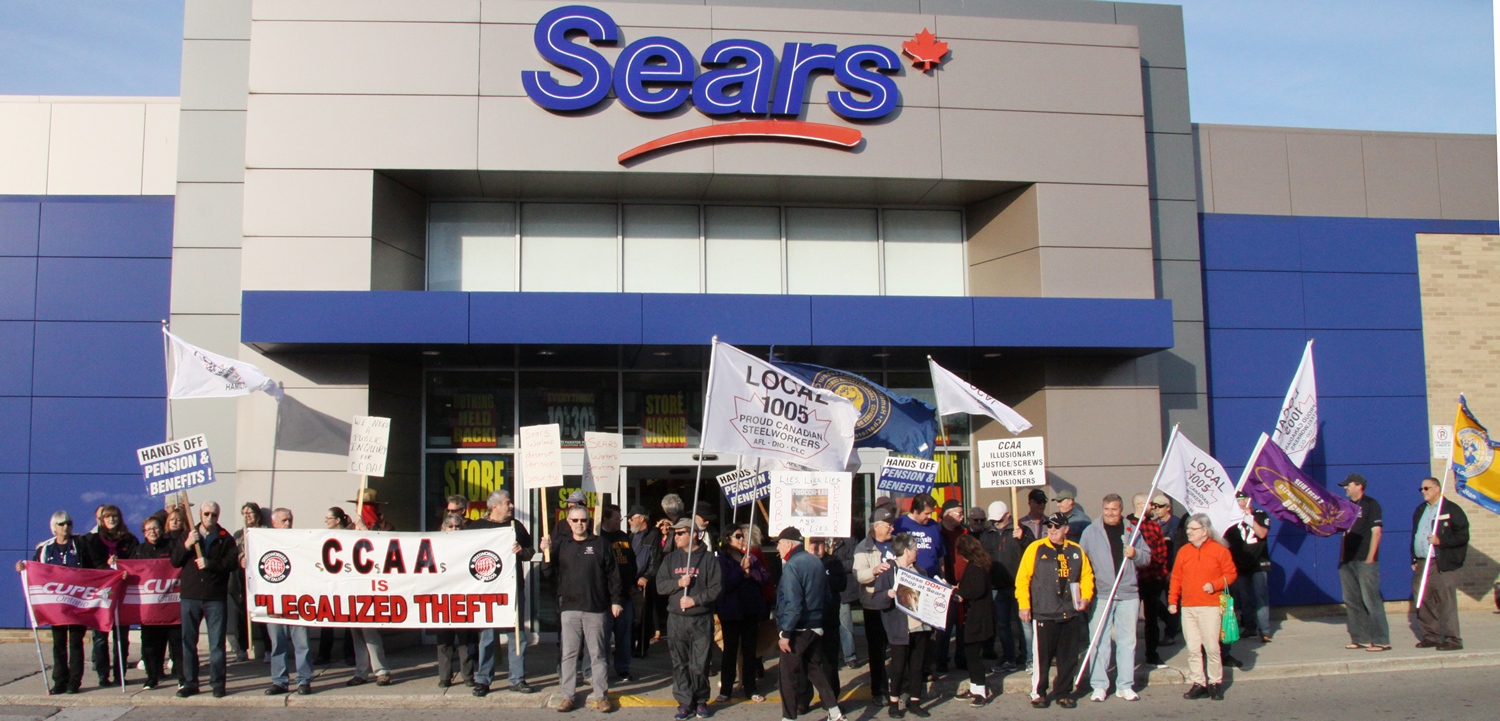
Mass picket outside Sears store in Hamilton, October 27, 2017.
The Sears debacle underscores the
necessity for a new direction
for the
economy and politics
Sears Canada closed its doors forever in January. The
bankruptcy directly affects 16,000 workers and retirees and many
others owed money by the defunct company for goods and services
supplied in good faith. Aside from
the loss of employment, active and retired workers face a reduced
company pension.
The deficit in the pension fund is a result of the
refusal of the U.S. owners of Sears to keep the pension plan solvent
and the unwillingness of governments to force them to uphold their
social responsibility. The plan began to fall into deficit with
continuous inadequate annual payments beginning in 2005. The lack
of funds going into the
pension fund occurred despite hundreds of millions of dollars going out
of the company and country as special dividends to U.S. shareholders
who had seized the company in 2005. The dominant shareholder by
far is Eddie Lampert, CEO of a U.S. social wealth controlling fund
called ESL Investments.
After ESL Investments took control of Sears Canada,
staggering amounts of cash were taken out of the company and country in
the form of "special dividends" to shareholders. Those shareholders
expropriated a total of $3.5 billion during the period, which
continued until 2013. Meanwhile, even according to Sears's own
actuaries,
the pension fund was in a crisis of underfunding falling $266 million
short of what would be necessary to fulfil its pension benefit
obligations when wound up.
The Sears Canada Retiree Group (SCRG), a collective of
Sears retirees told the CBC that the pension shortfall began
in 2007 shortly after ESL Investments seized control. The SCRG is
bracing for news that the situation could even be worse once the
bankruptcy proceedings are finalized. According to bankruptcy court
documents, the
SCRG continually expressed concerns since 2012 about the
diminishing pension fund at a time when Sears Canada sales and profits
were declining yet U.S. shareholders were taking billions out of the
company in special dividends. Sears retiree and SCRG vice-president Ken
Eady in an interview with the CBC said, "Sears didn't appear to be
committed to investing in Sears' future.... It's not necessarily the
[pension] shortfall that was the problem; it was about taking the money
out of the company and allowing the company not to operate properly,
thus leaving the pension plan high and dry."
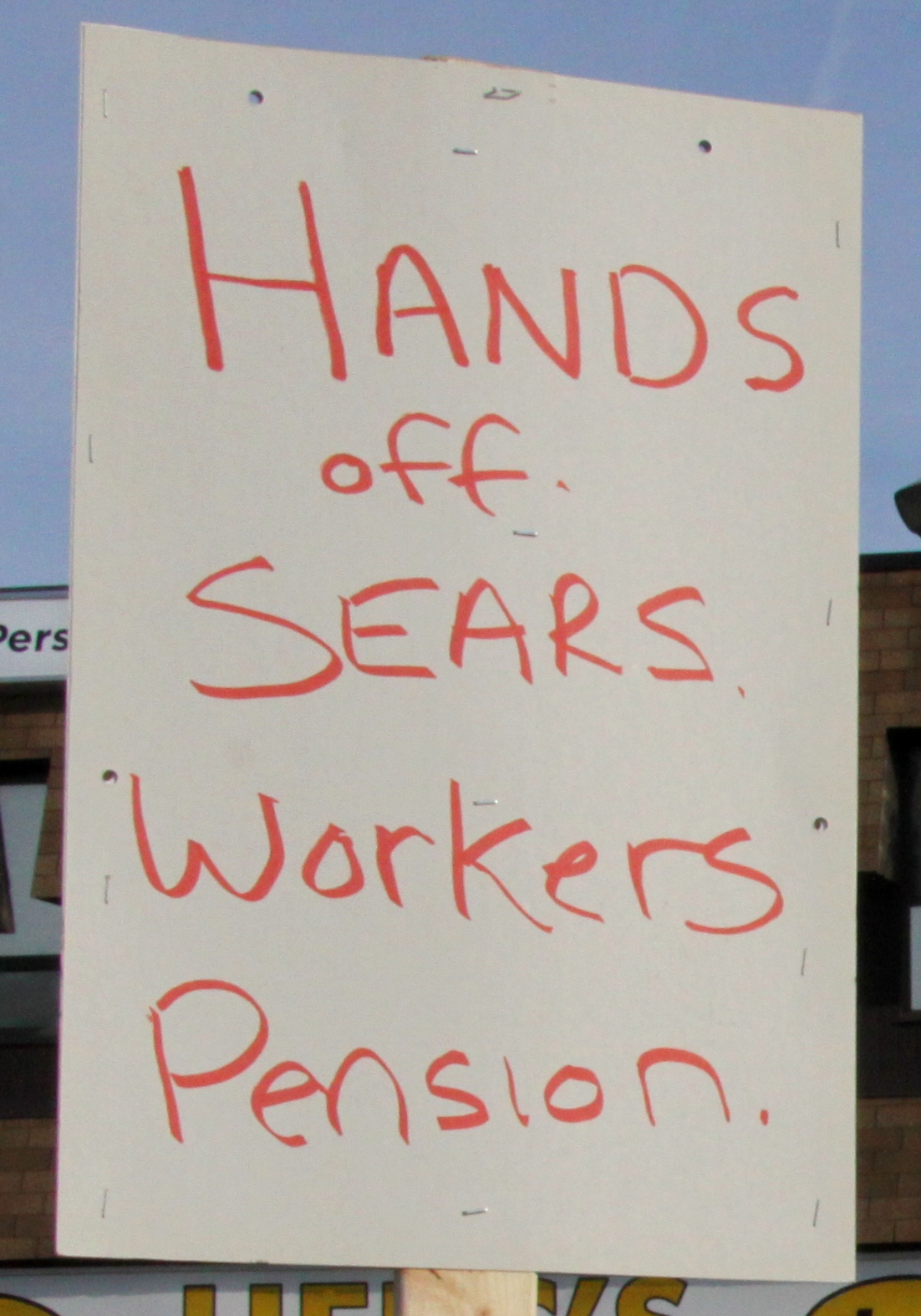 A 2014 letter sent to
Sears' legal counsel from lawyer Andrew Hatnay with Koskie Minsky, the
law firm representing Sears retirees, echoed the concerns of the SCRG.
The letter said that despite the deteriorating financial situation at
Sears Canada, its board of directors continued to approve big payouts
to shareholders following the sale
of assets such as valuable real estate. From 2005 to 2013,
the U.S. ownership gang took $3.5 billion out of Canada, largely
through special dividends. As a major Sears shareholder, ESL
Investments benefited significantly from the dividend payouts even
though available revenue from operations was falling and the company
needed extensive reinvestment and renewal. A 2014 letter sent to
Sears' legal counsel from lawyer Andrew Hatnay with Koskie Minsky, the
law firm representing Sears retirees, echoed the concerns of the SCRG.
The letter said that despite the deteriorating financial situation at
Sears Canada, its board of directors continued to approve big payouts
to shareholders following the sale
of assets such as valuable real estate. From 2005 to 2013,
the U.S. ownership gang took $3.5 billion out of Canada, largely
through special dividends. As a major Sears shareholder, ESL
Investments benefited significantly from the dividend payouts even
though available revenue from operations was falling and the company
needed extensive reinvestment and renewal.
The SCRG says Sears employees both currently retired
and those no longer employed at Sears face diminished pension benefits.
"They [Sears] couldn't afford to [top up the pension fund], but they
could pay out dividends," said Gail McClelland, a Sears retiree who
worked 33 years for the company in Calgary. McClelland told the
CBC
that she continuously paid a portion of her wages into the pension plan
while the company was expected to top it up so that it could meet its
obligations and guarantee a modest pension benefit for retirees.
The SCRG is scrambling to find alternatives within the
situation such as having Sears' liquidated assets go into the pension
fund and having provincial governments take over the fund as an active
pension plan by amalgamating it with other plans. Retirees are also
pushing the court appointed monitor of Sears Canada's insolvency to
review in
particular the $611 million that U.S. shareholders expropriated
from the Canadian company in special dividends in 2012
and 2013 when the continued existence of Sears Canada was already
in doubt and the pension plan was seriously underfunded.
The Sears case is yet another indictment of the current
economic, political and social arrangements exposing the necessity for
fundamental change. The fact that a supranational organization such as
the U.S.-owned and controlled ESL Investments can loot a Canadian
company and leave it in ruins and allow the pension fund to fall into
disarray
speaks loudly of the necessity for a new direction for the economy and
politics of Canada. Canadian working people and the institutions they
rely on should not be fair game for international parasites to pillage
and destroy yet no one from big business or any government or state
institution has been held to account for this disaster or any of the
other recent failures.
Canadians demand justice for Sears workers and retirees!
Hold those responsible for this debacle in government
and big business to account!
Canadian workers give their capacity to work to the
socialized economy and its enterprises and in return expect a Canadian
standard wage and pension for life. The oligarchs and governments have
left Sears workers and retirees in the lurch with no one in government
or business held to account. This provides added proof that the civil
society
of old is incapable of controlling the supranational forces of the rich
oligarchs within the U.S.-dominated imperialist system of states.
Security of employment and pensions for all are
ephemeral when control rests in the hands of private interests whose
aim is to expand their global empires and social wealth in reckless
schemes while completely unconcerned with the chaos, misery and crises
they cause. A rule of law, which in this case would label the actions
of these U.S.
privateers and their co-conspirators in government a grave crime, does
the opposite and facilitates their larceny. The Canadian working people
have to organize themselves in a way to extricate themselves and the
country from this imperialist system of states and establish a
sovereign state and nation-building project with an aim to serve the
people
and general interests of society and deprive these international
pirates of their power to pillage and destroy.
It Can Be Done! It Must Be Done!

Transportation
Dangerous Situation Requires Workers Hold Governments
and Private Interests to Account
The Transportation Safety Board (TSB) on
February 20 released
preliminary statistics of rail, air, marine and pipeline accidents that
occurred in 2017. Statistics show a general increase in accidents.
Rail Accidents
The TSB says 1,090 rail accidents were
reported to it
in 2017, an increase of 21 per cent over 2016. The TSB
reports 77
deaths from rail accidents in 2017, 11 more than
in 2016. Of the rail
accidents reported to the TSB, 115 involved dangerous goods, up
from 100
in 2016. Five of the accidents in 2017 resulted in the
release of
hazardous materials.
Pipeline Accidents
The number of pipeline transport accidents
increased
from zero in 2016 to five in 2017. One accident resulted in
a 200,000
litre spill of light oil from an Enbridge pipeline at an industrial
site near Edmonton. Curiously, a TSB spokesperson expressed little
concern about pipeline accidents because they were caused,
according to the TSB, by a rainier year in 2017, resulting in more
soil
erosion and increased the exposure of pipelines to disruptions and
spills. The fact that heavy rains can cause pipeline breaks and spills
is disturbing and concerning news for Canadians given the current mania
of the ruling elite to build more pipelines to export Canada's
raw and semi-refined material.
Meanwhile, Statistics Canada has published statistics
showing an
increase in the transportation of crude oil by pipeline. The amount of
crude oil transported by pipeline increased by 3.9 per cent
between 2016 and 2017. The increase is largely due to the
resumption of
oil shipments from Fort McMurray following the
wildfires of 2016 Statscan says.
Aviation Accidents
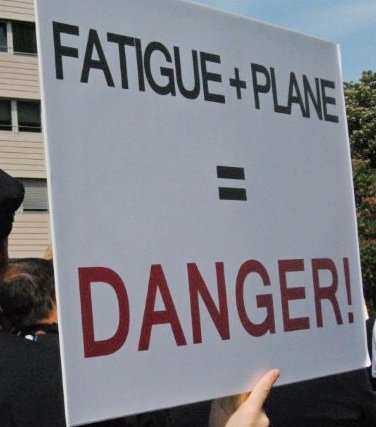 The number of aviation
accidents increased from 230
in 2016 to 239 in 2017, the TSB reports. The increase in
accidents in
the commercial transportation sector is particularly high, from 63
to 94. The number of aviation
accidents increased from 230
in 2016 to 239 in 2017, the TSB reports. The increase in
accidents in
the commercial transportation sector is particularly high, from 63
to 94.
A total of 921 aviation incidents were reported to
the TSB in 2017,
a significant increase over the previous year in which 833
aviation
incidents were reported. The TSB considers incidents to be events that
do not
necessarily lead to accidents. They include near misses that could have
led to disasters. Such a near miss occurred in
July 2017 when an Air Canada plane came within a few metres of
crashing
into four planes as it attempted a landing in San Francisco.
According to the TSB the increase in aviation incidents
is due in
particular to an increase in the risk of collision and "loss of
separation" (failure to maintain the minimum regulatory distance
between two aircrafts in flight). At the moment, the TSB does not
provide an explanation for these failures. In Canada, the first
reported collision
between a commercial aircraft and an unmanned aerial vehicle (a
drone) also occurred in 2017.
Marine Accidents
With respect to marine
transportation, 276 marine
accidents were reported to the TSB in 2017, a decrease of 10
per cent
from 2016, when 307 accidents occurred. However, marine
incidents
increased, with 875 reported to the TSB in 2017 compared
with 768
in 2016.
These statistics are disturbing and equally disturbing
is the
Trudeau government's refusal to examine seriously what these statistics
reveal and to take necessary corrective action. The day the TSB
statistics were released, the Trudeau government issued a
communiqué
through Transport Canada that employed the usual empty formulations to
avoid taking responsibility for the situation.
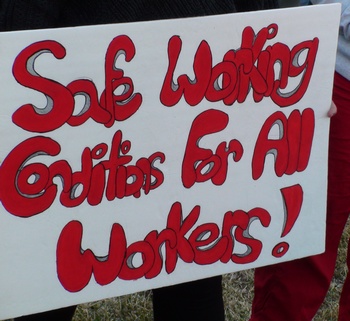 For example, Transport
Canada states that the oversight practices
in the aviation sector follow international standards and airlines are
required to have safety plans to go along with planned inspections.
Oversight is targeted where the risks appear greatest, based on
available data, a spokesperson said while adding, "Transport Canada has
a robust
oversight program that allows the department to prioritize its
resources to areas that provide the greatest safety benefit." For example, Transport
Canada states that the oversight practices
in the aviation sector follow international standards and airlines are
required to have safety plans to go along with planned inspections.
Oversight is targeted where the risks appear greatest, based on
available data, a spokesperson said while adding, "Transport Canada has
a robust
oversight program that allows the department to prioritize its
resources to areas that provide the greatest safety benefit."
Clearly, this mush is unacceptable. The Liberal
government does not
even clarify what "international standards" it follows. Nor does it
explain the reason for the application of certain standards if they do
not prevent and may even worsen the number of incidents and accidents.
The government cannot escape responsibility in the eyes of the
workers by claiming that others, the unnamed international standards
and airlines, are responsible for the situation that exists in the
transportation sector in Canada.
Workers demand the government must play a central role
in ensuring
that all transportation systems operate in a safe manner. Workers do
not accept that Canada must be part of a supranational chain of command
that does not take into account the specific characteristics in Canada
and the well-being of all peoples, including the Canadian
people. For example, to say international airlines are in control means
in effect working people exercise no control.
To counter the situation of supranational monopoly
control,
Canadian national standards must be worked out with a key role being
played by the experience and control of transport workers and other
concerned Canadians. The international standards the Trudeau government
refers to are those devised by the private global monopolies to serve
their narrow interests on a supranational basis. They dictate, among
other things, the reduction of safety measures in the name of their
competitiveness and empire-building. They impose on the transportation
systems their narrow economic aim of achieving the highest possible
money profit. The safe operation of Canada's transportation network
cannot be achieved with such a backward aim in command.
Chair of Pilots Association Speaks Out
The TSB report describes a deterioration of
the
accident record of Canada's transportation systems, which is certainly
not the direction Canadians want to see. Yet, the government has the
gall to boast about self-regulation of the transportation industry, and
about the so-called plans of the companies that go hand in hand with
the so-called
government inspections that have actually been reduced in terms of
their power, their scope, and are severely understaffed from want of
funds.
Greg McConnell, the National Chair of the Canadian
Federal Pilots Association (CFPA) spoke out about the situation in a
CBC
radio interview on February 22:
"Prior to being the Chair of the Canadian Federal
Pilots Association, I was an inspector for 24 years. I have witnessed
the dismantling of the aviation system as we used to know it to today's
state.... In 2005 every operator in this country was inspected on an
annual basis. Then it went to three years, and then it went to five
years and now operators are only inspected on the basis of identified
risk [in place of a full inspection
-- WF Note]. Generally we have become very reactive and not
proactive with respect to identifying problems and solutions to those
problems before they happen. Cuts are all about money. I want my people
to be properly trained. The courses that I have taken are not given any
more. They [Transport Canada] have not responded to TSB recommendations
for over 20 years, nor to the recommendations of the Auditor General,
nor to the 17 recommendations made in the spring by the Standing
Committee on Transportation Infrastructure and Communities. Last April,
Judge Moshansky called on Transport Canada to hold another national
inquiry into aviation safety. It has been 29 years since there has been
an inquiry in this country."
The Trudeau government and the private monopolies it
represents and
serves will not escape responsibility for the deterioration of the
safety and security of the transportation systems. Disasters are
waiting to happen and as Greg McConnell says Transport Canada is
reactive not proactive. The time has come to step up the struggle of
all
workers to ensure adequate safety and security throughout Canada's
transportation systems by using their organized voice and building
public opinion for action not reaction. Security and safety must be
wrested from the prerogative powers of transport monopolies and their
representatives in government who act for their own narrow economic
anti-social aim of money profit before all else and have shed any
attributes of public institutions that defend the public interest.

Senate Committee Report on Automated Vehicles
The Senate Committee on Transportation and
Communications submitted its report to the federal government in
January 2018, on the impact of future automated vehicles in
Canada. Around the same time the mining and oil monopoly Suncor Energy
Inc., which operates oil sands mines in northern Alberta among other
enterprises,
announced the loss of about 400 heavy machinery operator jobs to
be replaced eventually by automated trucks. These huge behemoths
manufactured by the Japanese company Komatsu at a sales price
of $5 million per unit can operate 24 hours a day,
interrupting operations only for maintenance and diesel refuelling,
according to
a company spokesperson.
The 12-member Senate Committee titled its report
"Driving Change." The over 70-page report included 16
recommendations for governments advising them "to start planning for
the arrival of these technologies in order to address concerns and to
ensure that Canadians realize the full potential of automated and
connected
vehicles" and to "help build a coordinated national strategy on
automated and connected vehicles."
Senator Patricia Bovey who is a leading member of the
Committee compared the current situation with the period before the
advent of the automobile. She commented, "One of the first jobs of
the Senate was to protect the horse and buggy drivers with the coming
of the automobile. Here we are at another quantum societal change
that's
going to happen regardless. It is happening."
According to the report of the Senate Committee, more
than 30 meetings were held, and the Committee received and heard
from more than 78 "key" witnesses in the field of new technology
and received several submissions from companies interested in the issue.
The report states that this technology could affect
more than 1.1 million Canadians in the coming years. The workers
affected, according to the report, are from a variety of sectors and
include taxi drivers, truck drivers, bus drivers, police officers,
instructors, tugboat operators, mechanics. Despite the prediction of
massive loss of jobs,
the committee's findings go in the same direction as claims of
technology monopolies such as Google, Uber and others. They paint a
glowing future where vehicle automation can bring dramatic improvement
in road safety. They say high-performance computers in vehicles are
better at anticipating danger than humans.
Echoing the predictions of the monopolies involved, the
Senate committee considers that the environment will be better
protected with the advent of automated vehicles and that they will also
provide social benefits, especially for the elderly and people with
disabilities who will have access to "safe and viable mobility" and
will benefit from
better social inclusion. The report also claims that automated vehicles
have great economic potential for the economy in terms of collision
avoidance, fuel cost savings, increased productivity in various
economic sectors etc.
In a section on what the report calls the potential
challenges of automated vehicles, the report highlights the actual
danger of massive job losses and the impact on the privacy of Canadians
because of data gathered on automated vehicles. The data include
information on navigation, traffic, weather and entertainment. The
systems can be paired
with a driver's phone giving the system access to the user's contact
list, incoming calls, messages or emails.
The report raises the problem of cyber security as data
generated by the automated vehicles can be used for nefarious purposes
by hackers and cyber terrorists. Two other challenges that need to be
met, according to the report, are building the necessary new
infrastructure and the need for a new vision on how to design big
cities.
The report mentions similar work being done on
automated vehicles in several industrialized countries including
Britain, the United States, Germany, France and Japan. Numerous tests
are being carried out all over the world in terms of research and
development of this new technology. Many monopolies are engaged in
research and testing.
Rio Tinto is already using 73 autonomous vehicles manufactured by
Komatsu to haul iron at four jobs sites in Australia. Autonomous
vehicles are also being used in Chile. In 2017 Suncor entered a
five-year agreement with Komatsu for construction and earthmoving
vehicles for use in Alberta, which they say will result in a net loss
of 400 jobs.
The Senate committee recommends that Transport Canada
and ISED (Innovation, Science and Economics Development Canada)
establish a policy to harmonize and coordinate the federal government's
efforts to implement a national strategy for the implementation of
automated vehicles including matters of security, cybersecurity and
privacy.
The report considers the dominance of automated
vehicles in the lives of the people in a not so distant future as a fait
accompli and claims, in a typically liberal way, that the issue is
to find a balance between these dramatic improvements that Canada
cannot afford to miss and the potential dangers they entail on various
fronts. Also
accepted without question is the control of the monopolies over these
changes at the workplace and throughout society to serve their narrow
private interests. The issue is not discussed or even raised of how the
working people in particular can gain control over the social products
they produce such as automated vehicles, so that the introduction of
these improvements or dramatic changes in the forces of production and
throughout society will favour the people and not harm their interests
and the general interests of society.

Human Factor and Social Responsibility
at the Heart of Workers' Security
- Normand Chouinard -
The report of the Senate Committee on Transport and
Communications on automated vehicles entitled "Driving Change" is very
revealing of what the ruling circles are planning for the hundreds of
thousands of Canadian workers to be hit by this "new industrial
revolution." The report shows the methods the ruling circles are using
to
eliminate any discussion about this "revolution" and to force workers
to accept what is on the horizon, not as thinking human beings but as
helpless onlookers without any possibility of exercising control.
For the ruling elite, a report of 75 pages, some
consultations with experts, a small hike in automated mini-buses in
front of the Canadian Parliament as part of the activities for the
150th anniversary of Confederation, repeating the opinions of "key"
players in the industry
selling the new technology, an official filing of a report to the state
institutions to which
they swore allegiance and the issue is finished. Case closed. The
products workers produce are considered out of conscious control of
those who produce them and poised to wreak havoc on the lives of many.
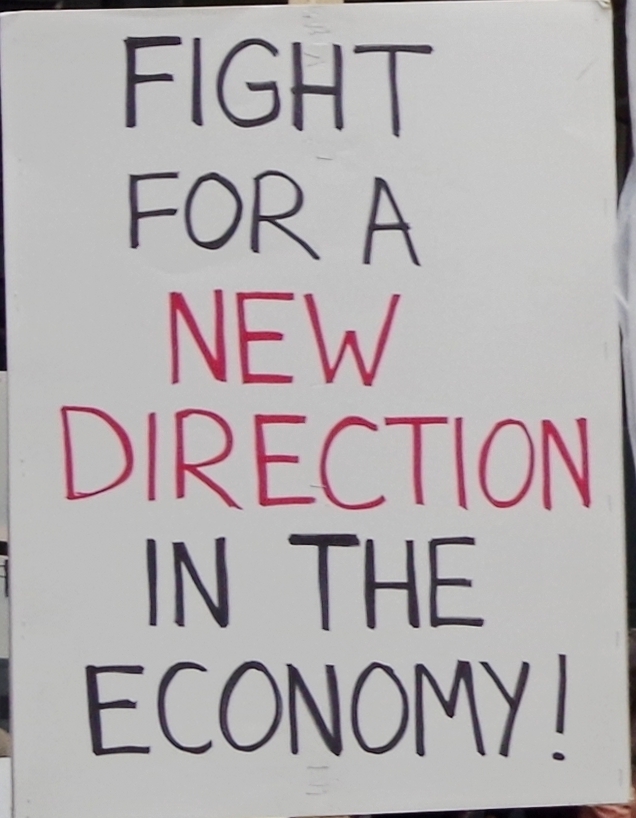 Canadian workers are told to
accept the coming changes as if no alternatives are possible. A vague
concern expressed by the ruling circles in this report about the jobs,
security and social changes engendered by the new technological
revolution
is supposed to convince the working class that the highest authorities
in government have taken their
social responsibilities seriously. The so-called balance among the
factors of privacy, jobs, security and automation is a government
priority for the elite to settle and the fate of workers and the
economy is in their hands. Canadian workers are told to
accept the coming changes as if no alternatives are possible. A vague
concern expressed by the ruling circles in this report about the jobs,
security and social changes engendered by the new technological
revolution
is supposed to convince the working class that the highest authorities
in government have taken their
social responsibilities seriously. The so-called balance among the
factors of privacy, jobs, security and automation is a government
priority for the elite to settle and the fate of workers and the
economy is in their hands.
Not so fast! For workers, social responsibility begins
at home in the hands of those who are affected, the human factor. It
does not belong in political institutions of a former century that have
irrevocably changed into instruments of powerful
supranational oligopolies serving select private interests. How are
workers supposed
to believe even for a second that their security will now be defended
and guaranteed by a new technology over which they have no control? By
what subterfuge do they want us to believe that a life in security for
the 400 Suncor laid-off miners will be ensured once their
livelihoods for which they trained and dedicated years of their lives
are
now gone forever? What balance, security or social responsibility on
the part of those in power are going to magically appear when such
factors have never been their aim? Workers know full well that the rich
and their representatives are driven by their narrow aim to expropriate
as much money profit as possible from the value workers produce.
They accept no balance with their singular aim as no other is tolerated.
What is occurring?
1. New technology now enables automated driving of
mining vehicles that are capable of operating 24 hours a
day, 7 days a week.
2. The Suncor monopoly has acquired technology through
the powers conferred on it by its ownership and control of its private
empire and the accumulation of immense social wealth from expropriating
the added-value produced through the work-time of the working class it
employs.
3. Four hundred workers are laid off and faced with an
uncertain future, the first of predicted hundreds of thousands to be
directly affected.
4. The introduction of greatly increased fixed means of
production reduces the added-value or money profit in relation to
invested social wealth, putting downward pressure on the rate of
profit.
To overcome this trend the monopolies increase production, which floods
the market with social product depressing prices as supply overwhelms
demand. They in turn attempt to manipulate the market price in their
favour all of which ends in yet another economic crisis.
5. Government and state authorities facilitate the
decision of Suncor and other private interests to introduce new
technology; police powers use state-organized
criminalization of workers' resistance to the attacks on their rights;
and, constant propaganda from the monopoly controlled mass media wrecks
public opinion that a
socially responsible alternative is possible that puts the human factor
at the heart of decision-making, where the actual producers of value,
the working class, is in control of the means of production and the
social product it produces.
That is the reality and challenge workers and society
face.
 Canadian workers are well
aware that what has happened at Suncor will be repeated many times in
the future with the exponential development of new automated
technology. The problem is not automation per se but how social
responsibility must be upheld in
modern society. Security is not just about road safety, which will be
affected by this automation. Security is about
how people participate in securing livelihoods, which is
impossible if workers do not control their economy, the conditions in
which they work to produce value and the social product they produce.
Assuming social responsibility within today's social conditions means
protecting workers from predatory monopolies and ensuring the
well-being of all members of society; it means putting the human factor
at the centre of all decisions on the direction of the economy; it
means the security of one and all can only exist in the defence of the
rights of one and all. The Senate committee's report is very far from
such a modern definition of security and social responsibility. Canadian workers are well
aware that what has happened at Suncor will be repeated many times in
the future with the exponential development of new automated
technology. The problem is not automation per se but how social
responsibility must be upheld in
modern society. Security is not just about road safety, which will be
affected by this automation. Security is about
how people participate in securing livelihoods, which is
impossible if workers do not control their economy, the conditions in
which they work to produce value and the social product they produce.
Assuming social responsibility within today's social conditions means
protecting workers from predatory monopolies and ensuring the
well-being of all members of society; it means putting the human factor
at the centre of all decisions on the direction of the economy; it
means the security of one and all can only exist in the defence of the
rights of one and all. The Senate committee's report is very far from
such a modern definition of security and social responsibility.
The concerns of workers, especially transport workers,
in the face of the advent of new automated technology are justified.
Every workday they are at the centre of modern production
and have adapted to a multitude of new production technologies since
the beginning of their existence as the essential productive force of
industrial mass
production. They can see with their own eyes that those who own and
control the giant private enterprises where they work ignore the
necessary social responsibilities of today's world and casually dismiss
the human factor/social consciousness.
Workers can only guarantee their full security if they
can control things and phenomena that affect them every day. They
must discuss among themselves a modern definition of security and carry
out actions with analysis with the full weight of their organizations
mobilized to defend their right to a life in which security for all and
the
well-being of the people and society are at the centre of human
development.

PREVIOUS
ISSUES | HOME
Website: www.cpcml.ca
Email: office@cpcml.ca
|

